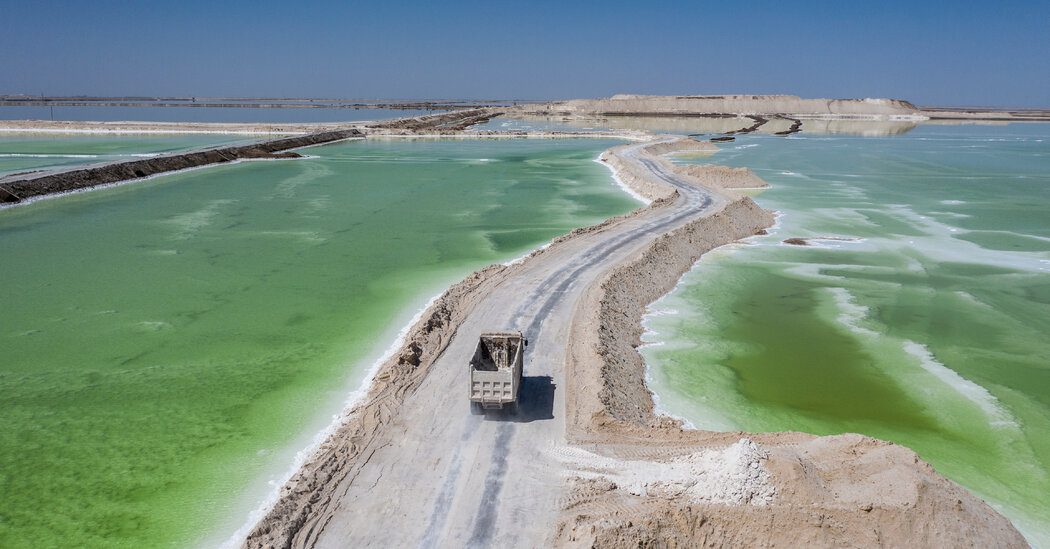Global Courant 2023-05-22 22:23:54
For decades, a group of the world’s largest oil producers has exerted enormous influence over the US economy and the popularity of US presidents through their control of the global oil supply, with decisions by the Organization of the Petroleum Exporting Countries determining what US consumers pay for at the pump.
As the world transitions to cleaner energy sources, control over the materials needed to make that transition possible is still up for grabs.
China currently dominates the global processing of the critical minerals now in high demand to make batteries for electric vehicles and renewable energy storage. In an effort to gain more power over that supply chain, US officials have begun negotiating a series of agreements with other countries to expand America’s access to key minerals such as lithium, cobalt, nickel and graphite.
But it remains unclear which of these partnerships will succeed, or if they will be able to generate anything close to the supply of minerals the United States is expected to need for a wide variety of products, including electric cars. and batteries for storing solar energy.
Leaders of Japan, Europe and other advanced countries, meeting in Hiroshima, agree that the world’s dependence on China for more than 80 percent of mineral processing leaves their nations vulnerable to political pressure from Beijing, which history of weaponizing supply chains in times of conflict.
On Saturday, the leaders of the Group of 7 countries reaffirmed the need to manage the risks posed by fragile mineral supply chains and build more resilient resources. The United States and Australia have announced a partnership to share information and coordinate standards and investments to create more responsible and sustainable supply chains.
“This is a huge step, from our perspective – a huge step forward in our fight against the climate crisis,” President Biden said on Saturday as he signed the agreement with Australia.
But figuring out how to access all the minerals the United States needs will still be a challenge. Many mineral-rich countries have poor environmental and labor standards. And while speeches at the G7 emphasized alliances and partnerships, the rich countries are still essentially competing for scarce resources.
Japan has signed a critical minerals agreement with the United States and Europe is negotiating an agreement. But like the United States, those regions have significantly greater demand for critical minerals to feed their own factories than there is sufficient supply.
Kirsten Hillman, Canada’s ambassador to the United States, said in an interview that the allied countries had an important industry partnership, but they were also commercial competitors to some degree. “It’s a partnership, but it’s a partnership with certain tensions,” she said.
“It’s a complicated economic geopolitical moment,” Ms Hillman added. “And we’re all committed to getting to the same place and we’re going to work together to do it, but we’re going to work together to do it in a way that’s also good for our businesses.”
“We need to create a market for the products that are produced and made in a way that is consistent with our values,” she said.
The State Department has moved forward with a “partnership for mineral safety”, with 13 governments trying to promote public and private investment in their critical mineral supply chains. And European officials have called for a critical minerals “buyer’s club” with the G7 countries, which could establish certain common labor and environmental standards for suppliers.
Indonesia, the world’s largest nickel producer, has floated the idea of joining other resource-rich countries in forming an OPEC-like producer cartel, a scheme that would try to shift power to mineral suppliers.
Indonesia has also approached the United States in recent months seeking an agreement similar to that of Japan and the European Union. Biden administration officials are considering whether to give Indonesia some sort of preferential access, either through an independent deal or as part of a trade framework the United States is negotiating in the Indo-Pacific.
But some US officials have warned that Indonesia’s lagging environmental and labor standards could allow materials into the United States that undermine the country’s burgeoning mines and its values. Such a deal is also likely to spark fierce resistance in Congress, where some lawmakers criticized the Biden administration’s deal with Japan.
Jake Sullivan, the national security adviser, alluded to these compromises in a speech last month, saying negotiating with critical mineral-producing states would be necessary but would raise “hard questions” about labor practices in those countries and America’s broader environmental goals.
Whether America’s new agreements would take the form of a critical minerals club, a more comprehensive negotiation or something else was unclear, Mr Sullivan said: “We’re busy figuring that out right now.”
Cullen Hendrix, a senior fellow at the Peterson Institute for International Economics, said the Biden administration’s strategy to build safer international mineral supply chains outside of China has so far been “a bit disjointed and not necessarily enough to achieve that goal.” .
Demand for minerals in the United States has been boosted largely by President Biden’s climate bill, which provided tax incentives for investment in the electric vehicle supply chain, particularly in the final assembly of batteries. But Mr Hendrix said the law appeared to have less success in rapidly increasing the number of domestic mines that would supply those new plants.
“The United States will not be able to do this alone,” he said.
Biden officials agree that obtaining a safe supply of the minerals needed to power electric vehicle batteries is one of their most pressing challenges. US officials say the global supply of lithium alone needs to increase 42 times by 2050 to meet rising demand for electric vehicles. Forecasts from the International Energy Agency suggest that global lithium demand will grow 42 times by 2040.
While innovations in batteries could reduce the need for certain minerals, the world is currently facing dramatic long-term shortages, it is estimated. And many officials say Europe’s reliance on Russian energy after the invasion of Ukraine helped illustrate the danger of foreign dependencies.
The global demand for these materials is sparking a wave of resource nationalism that could intensify. Outside the United States, the European Union, Canada and other governments have also introduced subsidy programs to better compete for new mines and battery plants.
Indonesia gradually increased restrictions on the export of raw nickel ore, requiring it to be processed in the country first. Chile, a major producer of lithium, has proposed nationalizing its lithium industry to better control how its resources are developed and used, as have Bolivia and Mexico.
And Chinese companies are still investing heavily in acquiring mines and refinery capacity worldwide.
For now, the Biden administration seems wary of making deals with countries with more mixed labor and environmental records. Officials are exploring changes needed to develop U.S. capability, such as faster mine licensing procedures, as well as closer partnerships with mineral-rich allies such as Canada, Australia and Chile.
The White House said on Saturday intends to ask Congress to add Australia to a list of countries where the Pentagon can fund critical mineral projects, criteria that currently only apply to Canada.
Todd Malan, the chief external affairs officer at Talon Metals, who has proposed a nickel mine in Minnesota to supply Tesla’s North American production, said adding a top ally like Australia, which has high production standards related to environmental, labor rights and Indigenous Participation, to that list was a “smart move.”
But Mr Malan said expanding the list of countries eligible for benefits under the government’s new climate law beyond countries with similar labor and environmental standards would undermine efforts to develop a stronger supply chain in the United States. can undermine.
“If you open the door to Indonesia and the Philippines or elsewhere where you don’t have the common standards, we would consider that out of the spirit of what Congress was trying to do to drive a home and friend battery supply chain.” he said.
However, some U.S. officials argue that supplies of critical minerals in rich countries with high labor and environmental standards will be insufficient to meet demand, and that the lack of new agreements with resource-rich countries in Africa and Asia will greatly harm the United States. could leave. vulnerable.
While the Biden administration attempts to streamline the United States’ permitting process for new mines, obtaining approval for such projects could take years, if not decades. Auto companies, which are major U.S. employers, also warned of expected shortages in battery materials and advocated for schemes that would give them more flexibility and lower prices.
The G7 countries, along with those with which the United States has free trade agreements, produce 30 percent of the world’s lithium chemicals and about 20 percent of refined cobalt and nickel, but only 1 percent of natural flake graphite, according to estimates by Adam Megginson , price analyst at Benchmark Mineral Intelligence.
Jennifer Harris, a former Biden White House official who worked on a crucial minerals strategy, argued that the country needs to move faster to develop and allow domestic mines, but that the United States also needs a new framework for multinational mining. negotiations with countries that are major mineral exporters.
The government could also create a program to store minerals such as lithium when prices are low, which would give miners more assurance that they will find destinations for their products, she said.
“There’s so much that needs to happen for this to really be an ‘both/and’ world,” she said. “The challenge is that we have to get many more stones out of the ground in a responsible manner yesterday.”
Jim Tankersley reported from Hiroshima, Japan.








